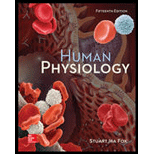
Human Physiology
15th Edition
ISBN: 9781259864629
Author: Fox, Stuart Ira
Publisher: Mcgraw-hill Education,
expand_more
expand_more
format_list_bulleted
Question
Chapter 19, Problem 43RA
Summary Introduction
To review:
The percentage of the normal two-hour level of blood glucose in type II diabetes in two hours following glucose ingestion.
Introduction:
The blood glucose levels are regulated by insulin and glucagon hormones secreted by the pancreatic cells. Insulin regulates the increased blood glucose levels whereas glucagon raises the low blood glucose levels. High blood glucose levels results in a severe condition known as diabetes, which affects the functioning of different processes of the body.
Expert Solution & Answer
Want to see the full answer?
Check out a sample textbook solution
Students have asked these similar questions
What is behavioral adapt
22. Which of the following mutant proteins is expected to have a dominant negative effect when over-
expressed in normal cells?
a. mutant PI3-kinase that lacks the SH2 domain but retains the kinase function
b. mutant Grb2 protein that cannot bind to RTK
c. mutant RTK that lacks the extracellular domain
d. mutant PDK that has the PH domain but lost the kinase function
e. all of the above
What is the label ?
Chapter 19 Solutions
Human Physiology
Ch. 19 - Explain how the metabolic rate is influenced by...Ch. 19 - Prob. 2aCPCh. 19 - Prob. 2bCPCh. 19 - Prob. 3CPCh. 19 - Distinguish between the energy reserves and...Ch. 19 - Prob. 5CPCh. 19 - Identify the brain regions involved in hunger and...Ch. 19 - Prob. 7CPCh. 19 - Describe how the secretions of insulin and...Ch. 19 - Prob. 8bCP
Ch. 19 - Define the following terms: glycogenolysis,...Ch. 19 - Prob. 9CPCh. 19 - Prob. 10aCPCh. 19 - Prob. 10bCPCh. 19 - Explain the meaning of the terms insulin...Ch. 19 - Prob. 12aCPCh. 19 - Prob. 12bCPCh. 19 - Prob. 13aCPCh. 19 - Prob. 13bCPCh. 19 - Describe the mechanisms by which the secretion of...Ch. 19 - Prob. 15aCPCh. 19 - Prob. 15bCPCh. 19 - Prob. 15cCPCh. 19 - ln questions 1-5, match the item to the correct...Ch. 19 - Prob. 2RACh. 19 - Prob. 3RACh. 19 - Prob. 4RACh. 19 - Prob. 5RACh. 19 - Prob. 6RACh. 19 - Prob. 7RACh. 19 - Prob. 8RACh. 19 - Prob. 9RACh. 19 - The increased intestinal absorption of calcium is...Ch. 19 - Prob. 11RACh. 19 - Prob. 12RACh. 19 - Prob. 13RACh. 19 - Prob. 14RACh. 19 - Prob. 15RACh. 19 - Prob. 16RACh. 19 - Prob. 17RACh. 19 - Prob. 18RACh. 19 - Prob. 19RACh. 19 - Prob. 20RACh. 19 - Prob. 21RACh. 19 - Prob. 22RACh. 19 - Prob. 23RACh. 19 - Prob. 24RACh. 19 - Prob. 25RACh. 19 - Prob. 26RACh. 19 - Prob. 27RACh. 19 - Describe the conditions of gigantism, acromegaly,...Ch. 19 - Describe how hormones secreted by the...Ch. 19 - Prob. 30RACh. 19 - Prob. 31RACh. 19 - Prob. 32RACh. 19 - Prob. 33RACh. 19 - Prob. 34RACh. 19 - Prob. 35RACh. 19 - Prob. 36RACh. 19 - Prob. 37RACh. 19 - Prob. 38RACh. 19 - Prob. 39RACh. 19 - Prob. 40RACh. 19 - Prob. 41RACh. 19 - Prob. 42RACh. 19 - Prob. 43RA
Knowledge Booster
Similar questions
- Can you described the image? Can you explain the question as well their answer and how to get to an answer to an problem like this?arrow_forwardglg 112 mid unit assignment Identifying melting processesarrow_forwardGive only the mode of inheritance consistent with all three pedigrees and only two reasons that support this, nothing more, (it shouldn't take too long)arrow_forward
- Oarrow_forwardDescribe the principle of homeostasis.arrow_forwardExplain how the hormones of the glands listed below travel around the body to target organs and tissues : Pituitary gland Hypothalamus Thyroid Parathyroid Adrenal Pineal Pancreas(islets of langerhans) Gonads (testes and ovaries) Placentaarrow_forward
- What are the functions of the hormones produced in the glands listed below: Pituitary gland Hypothalamus Thyroid Parathyroid Adrenal Pineal Pancreas(islets of langerhans) Gonads (testes and ovaries) Placentaarrow_forwardDescribe the hormones produced in the glands listed below: Pituitary gland Hypothalamus Thyroid Parathyroid Adrenal Pineal Pancreas(islets of langerhans) Gonads (testes and ovaries) Placentaarrow_forwardPlease help me calculate drug dosage from the following information: Patient weight: 35 pounds, so 15.9 kilograms (got this by dividing 35 pounds by 2.2 kilograms) Drug dose: 0.05mg/kg Drug concentration: 2mg/mLarrow_forward
- A 25-year-old woman presents to the emergency department with a 2-day history of fever, chills, severe headache, and confusion. She recently returned from a trip to sub-Saharan Africa, where she did not take malaria prophylaxis. On examination, she is febrile (39.8°C/103.6°F) and hypotensive. Laboratory studies reveal hemoglobin of 8.0 g/dL, platelet count of 50,000/μL, and evidence of hemoglobinuria. A peripheral blood smear shows ring forms and banana-shaped gametocytes. Which of the following Plasmodium species is most likely responsible for her severe symptoms? A. Plasmodium vivax B. Plasmodium ovale C. Plasmodium malariae D. Plasmodium falciparumarrow_forwardStandard Concentration (caffeine) mg/L Absorbance Reading 10 0.322 20 0.697 40 1.535 60 2.520 80 3.100arrow_forwardPlease draw in the missing answer, thank youarrow_forward
arrow_back_ios
SEE MORE QUESTIONS
arrow_forward_ios
Recommended textbooks for you
 Human Physiology: From Cells to Systems (MindTap ...BiologyISBN:9781285866932Author:Lauralee SherwoodPublisher:Cengage LearningEssentials of Pharmacology for Health ProfessionsNursingISBN:9781305441620Author:WOODROWPublisher:Cengage
Human Physiology: From Cells to Systems (MindTap ...BiologyISBN:9781285866932Author:Lauralee SherwoodPublisher:Cengage LearningEssentials of Pharmacology for Health ProfessionsNursingISBN:9781305441620Author:WOODROWPublisher:Cengage





Human Physiology: From Cells to Systems (MindTap ...
Biology
ISBN:9781285866932
Author:Lauralee Sherwood
Publisher:Cengage Learning

Essentials of Pharmacology for Health Professions
Nursing
ISBN:9781305441620
Author:WOODROW
Publisher:Cengage